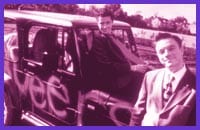For a guy who wrote one of the most intense gay dramas of the past decade, Russell T Davies is one sunny individual. Davies’s Queer As Folk veers from tragedy to farce, but always plays close to the bone. For anyone with any experience of gay life, its insights can be devastating.
Yet on the phone from his home in Manchester, the Welsh-born Davies is garrulous, funny, enthusiastic, blunt, determined and most of all, very, very funny. Told that Showcase is running his masterpiece at midnight (beginning Mon, Jun 5), he laughs hysterically: “Oh brilliant, like porn!”
It isn’t of course, but some will think so. The story of three glam gay guys in Manchester, it features drugs, porn, orgies, casual sex and explicit intergenerational sex. Within the first half hour, cocky 29-year-old Stuart picks up eager 15-year-old Nathan and before you know it, it’s tongue-to-bum time.
Nathan’s age caused a huge stir in the UK where even some gay politicos objected to Davies’ blunt depiction of gay life. But Davies got his own back in the sequel (which airs Mon, Jul 3) where various characters point out that straights get pregnant at 15 and gays often know their orientation at an even earlier age. In the last episode, Vince, the third key character, points out a five-year-old who is obviously gay.
“That was my intention,” says Davies, “just to laugh in the face of those people who just deny sexuality at a young age. I’m not saying those [young] people should be having sex, but you can spot it, you can look at some 11-year-old boys and say, ‘You’re gay.’ People are so scared of that.”
An activist in artist’s clothing, Davies pushes the envelope without ever pushing issues. Queer As Folk is defiantly in your face, but it’s strictly character-based, which is to say it’s about people, not political movements. All three of the lead actors are straight but they’re entirely convincing as gay men because, says Davies, they never sat around discussing what it means to be gay. They just played the characters.
Gay writers, says Davies, often make the mistake of apologizing for or explaining the community. But, as Gub Neal, the man who commissioned the series for Britain’s Channel 4, once told him, “Just remember that the audience is clever.” They don’t need to be told how things work in the bars, clubs and other outposts of gay culture. “It’s far better just to show it,” says Davies.
Going into the series, Davies wanted to explore friendship and unrequited love and he found the perfect vehicle in the characters of Vince and Stuart, friends since the age of 14, almost married, sometimes lusty, always devoted, but never quite committed.
Everyone has experienced unrequited love, says Davies, but that sort of couple is unique to gay life. He knows. He meets them all the time.
“Just before I wrote episode one, I met a couple like that, and the not so good looking bloke was hopelessly in love with the very good looking bloke and they’d known each other since they were kids and he was never, ever going to say it. And I thought, ‘Oh my God, that’s it, that’s what I’m writing about.'”
There’s really no precedent for this sort of gay-centred drama on network television. Davies himself has written queer plot lines for various British soaps and an all-gay episode of The Grand (directed by Sarah Harding, who also directed episodes five to eight of QAF). The gay characters on This Life, the British drama about 20-something lawyers, helped prepare the ground, says Davies.
“Though it didn’t help pave the way for a 15-year-old being rimmed, I have to say.”
Queer As Folk is not autobiographical but Davies didn’t have to reach too far for his material. One of the most harrowing scenes in the series, where a guy drops dead in the midst of a one-night stand, resembles something that happened to Davies.
He doesn’t usually do drugs but he snorted something (“God knows what it turned out to be”) to impress a younger trick, had a bad reaction and ended up on his kitchen floor. His trick was nicer than the guy in the film and Davies came around within a couple of hours, but the memory stayed with him. “It was two days after Princess Diana died. I vaguely remember lying on the floor thinking, ‘God, I won’t make a single headline!'”
Having written the sequel, Davies is through with the QAF boys for good. While loads of people loathed his ending, he loves it because it brought the drama to a definite conclusion, ending the possibility of a soap opera.
He hasn’t given up on controversy, however. For his next project, he’s writing a four-hour drama entitled The Second Coming, in which the son of God appears in Manchester and hell proves to be real. “The pope will be after my blood,” says Davies, “which is quite an exciting situation to be in.”
The religious drama is part of a project to reclaim the big themes for TV. Theatre and film routinely tackle controversial subject matter and no one’s shocked, says Davies. So why not TV? Despite offers from the film world, Davies has no intention of deserting a medium he loves. He grew up with TV. “My parents never switched the television off,” he says.
He loves everything about it from cheap game shows to quality dramas like Cracker and Prime Suspect. And he fully intends to push the envelope.
“You can be completely radical within television and pipe that into someone’s house and you can actually get away with murder.”
Queer as Folk.
Midnight.
Mondays, Jun 5-Jul 3.
Showcase.

 Why you can trust Xtra
Why you can trust Xtra


